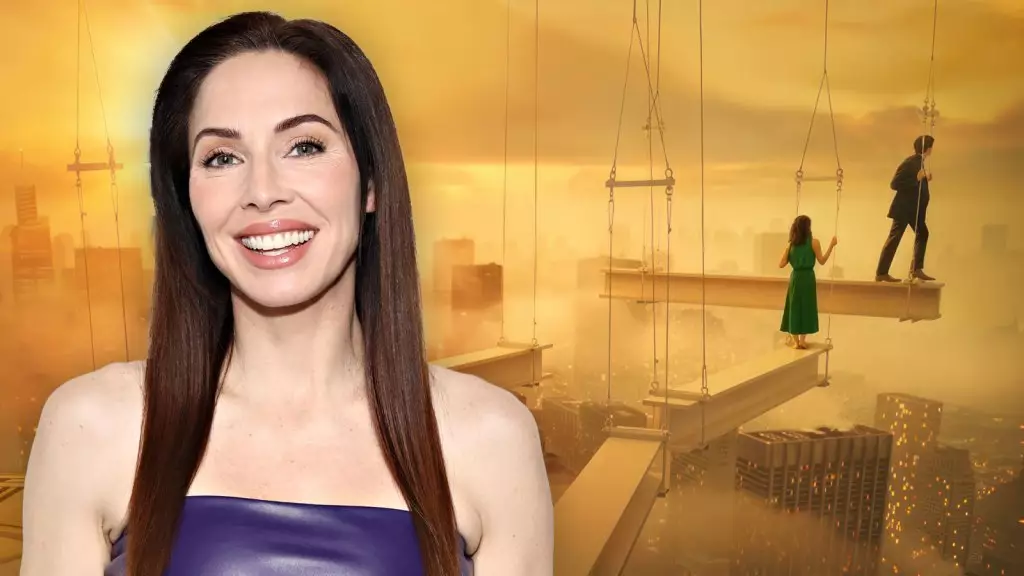Auditioning for a film can be a make-or-break moment for many actors and actresses, where nerves run high and anxiety often overshadows talent. In the entertainment industry, the road to securing a role is fraught with uncertainty, and Whitney Cummings’ recent recount of her audition for Francis Ford Coppola’s ambitious film, *Megalopolis*, reveals the vulnerably tangled experience that many performers face. Cummings, a successful comedian and host, disclosed her “humiliating” attempt to impress the legendary director while making a guest appearance on the *Good For You* podcast. This narrative of mishaps reflects the inherent challenges of auditioning and evokes empathy for those striving to succeed in show business.
Cummings vividly recalls the peculiar ambiance that enveloped the audition room. Out of the gate, the lack of energy and casual banter among the team suggested that this was not going to be an ordinary audition. Instead of the typical rush of excitement or the reassuring words that could ease the nerves, a sense of disconnectedness permeated the environment. The actress described herself entering the room and attempting to inject some levity—asking how they wanted to commence—but was confronted with a stark dismissal. Coppola’s disinterest in starting with the prepared scenes left Cummings feeling like she had wasted valuable time, reflecting an unusual approach to the audition process altogether.
In an industry where preparation is fundamental, Cummings’ experience highlights the unpredictability of auditions. The traffic of emotions she experienced underscores a reality many performers face—despite their enthusiasm and preparation, they must adapt to the whims of directors who might have a very different vision in mind.
Navigating through the session, Cummings found herself thrust into a whirlwind of improvisation, an area where spontaneity reigns but can also lead to overwhelming confusion. Coppola’s directive to improvise various scenes not only brought challenges but also bewilderment. The actress shared humorous anecdotes about performing distinct accents and bidding farewell to a fictional son going off to war, tasks that juxtaposed the gravity of the situation with a comedic twist. This bizarre request gave her pause—could she truly connect with the concept while wrestling with an ever-present feeling of humiliation?
The clash between her comedic instincts and the serious, high-stakes environment amplified the tension. Feeling as if she were being “punked,” Cummings’ recount fuels discussions on the eccentricities of directors and the unorthodox methods they sometimes employ to unearth raw talent. However, one must wonder: can drastic improvisation truly reveal an actor’s range, or does it extinguish their inherent essence by placing them under extreme duress?
As the alchemy of emotions reached its peak, Cummings experienced a phenomenon many can relate to when faced with intense pressure—disassociation. She described a state of mind where her body performed actions while her mind retreated in bewilderment, a sensation both haunting and poignant. This revelation places her audition experience on the broader spectrum of performers’ mental health, illustrating how high-pressure environments can result in a disconnect from reality. Conversely, this disconnection also led her to an absurdity—where, amidst humiliation, she momentarily entertained the likelihood of being part of an elaborate prank orchestrated by the industry.
By the end of the ordeal, as Coppola offered Cummings a signed copy of his new book and a bottle of his wine, the apparent kindness felt tainted by the surrounding discomfort. This moment encapsulated her feelings, a mix of gratitude and acute embarrassment. Being treated as an actor showing up for an autograph signing rather than a candidate for a role beautifully portrays the absurdity so integral to the world of auditions.
Whitney Cummings’ experience with *Megalopolis* was undeniably a profound, albeit painful, part of her career narrative. It serves as a powerful reminder that the pursuit of artistic expression often involves battling through vulnerability, awkwardness, and the elements of chance. As *Megalopolis* grossed over $13 million despite its $120 million budget, sustaining an extravagant cinematic endeavor poses profound questions about the creative process.
Cummings’ anecdote reveals that with each audition—a ritual experienced by many—there lies an opportunity for learning and growth, even within the chaos and confusion. The entertainment industry is riddled with highs and lows, and Cummings’ candid reflection epitomizes the resilience required to navigate its tumultuous waters while maintaining a sense of humor. Ultimately, the audition may have left her feeling humiliated, but it also serves as a reminder of her tenacity and willingness to embrace every moment in her artistic journey.


Leave a Reply